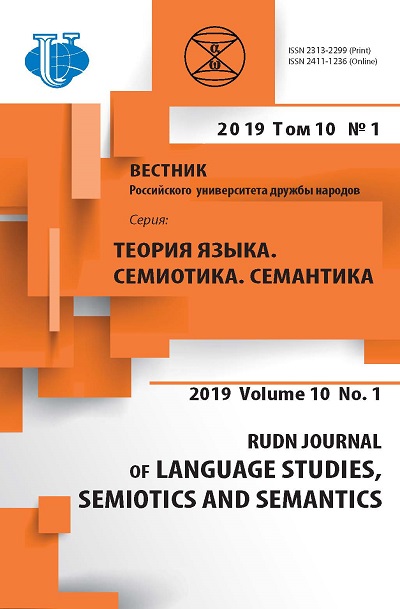CANTONESE DIALECT IN MODERN CHINA: THE PROBLEM OF CONSERVATION
- Authors: Barov S.A1, Egorova M.A2
-
Affiliations:
- Financial University under the Government of the Russian Federation
- Peoples’ Friendship University of Russia (RUDN University)
- Issue: Vol 10, No 1 (2019)
- Pages: 152-166
- Section: MISCELLANEA: SYSTEMIC APPROACH IN THEORETICAL AND APPLIED DESCRIPTIONS OF LANGUAGE
- URL: https://journals.rudn.ru/semiotics-semantics/article/view/20899
- DOI: https://doi.org/10.22363/2313-2299-2019-10-1-152-166
- ID: 20899
Cite item
Full Text
Abstract
The artice is devoted to the problem of preserving the Cantonese dialect (language) in modern China, where for several decades the government persistently pursued a policy of disseminating of the nation-wide Chinese language (“pǔtōnghuà”). Cantonese is the largest language by speakers among all Chinese languages and it is native to most residents of Guangdong and Hong Kong, however, unlike the languages of the national minorities of China, it is not fully protected by law and is consistently ousted from the education system and out of business communication. In the article the authors carefully analyze the linguistic history of China, the role of dialects in the system of Chinese languages and the historical and political significance of a single written norm. According to the authors, the division of China into two large cultural and historical communities (northern and southern) corresponds to the established linguistic division, but unlike many other countries in the world, the ethnolinguistic and ethnocultural differences between the northern and southern Chinese due to the centuries-old unifying efforts of the central government do not lead to the division of the Chinese nation. The article examines in detail the history of Cantonese, a linguistic analysis of the differences between Cantonese and Putonghua, and on this basis concludes that Cantonese should be considered not as a dialect of Chinese, but rather as a separate language of the Sino-Tibetan language group, albeit closely related to the Chinese language. Analyzing the role of Cantonese in the formation of a special cultural and historical community in Guangdong and Hong Kong, the authors conclude that the declining of the Cantonese dialect (language) will probably occur over the next several decades, unless the language and education policies of the Chinese government are changed. Otherwise this tendency will lead to the loss of the province's identity, which is part of the intangible cultural heritage of the entire Chinese nation.
About the authors
Sergey A Barov
Financial University under the Government of the Russian Federation
Author for correspondence.
Email: barov1986@mail.ru
Candidate of Political Sciences, Associate Professor, the Department of Language Training
Leningradskiy prospekt, 49, Moscow, Russia, 125993Maia A Egorova
Peoples’ Friendship University of Russia (RUDN University)
Email: egorova_ma@pfur.ru
Candidate of Political Sciences, Associate Professor, the Department of Foreign Languages, Faculty of Humanities and Social Sciences
6, Miklukho-Maklaya str., Moscow, Russia, 117198References
- Egorova, M.A. (2017). China's policy in the spread of the state language Putonghua In Language Policy in the Context of Globalization, G.O. Lukyanova (Ed.). Moscow: RUDN University. pp. 70—75. (In Russ.).
- Zavyalova, O.I. (2010). Language situation and language policy in the PRC [Electronic resource]. URL: http://www.ifes-ras.ru/attaches/books texts/Zavyalova._Language_situation_in_PRC.pdf (accessed: 15.10.18). (In Russ.).
- Kaplunova, M.Ya. (2017). Language policy and functional development of languages in the PRC [abstract of dissertation]. Moscow. (In Russ.).
- Regions of China, Russian. China Org. Cn. [Electronic resource]. URL: http://russian.china.org.cn/ china/archive/province-new/node_2188967.htm (accessed: 15.10.18).
- Barnes, D. (1982). Nationalism and the Mandarin movement: the first half-century. In Language spread: Studies in diffusion and social change, R.L. Cooper (Ed.). Bloomington: Indiana Press.
- Barov, S.A., Egorova, M.A. & Medvedev, Y.S. Educational programs of the Chinese government to popularize Chinese science, culture and language abroad In INTED2018, Valencia, 05—07 of March 2018.
- Bruche-Schulz, G. (1997). Fuzzy’ Chinese: The status of Cantonese in Hong Kong. Journal of Pragmatics, 27 URL: http://www.academia.edu/4018338/Fuzzy_Chinese_The_status_ of_Cantonese_in_Hong_Kong (accessed: 15.10.18).
- Fǎdìng yǔwén tiáolì, Dì 5 zhāng, dì 3 tiáo, Fǎdìng yǔwén yǔqí dìwèi yǔ yìngyòng (Language Ordinance (Chapter 5, point 3, Official languages, their status and application). URL: http://www.hklii. hk/chi/hk/legis/ord/5/s3.html (accessed: 10.15.18).
- Mò, Lì (2010). Chēng Zàngyǔ-Háizimen fāqǐ de wénhuà zìjiù / kàn bùjiàn de Xīzáng. URL: http://woeser.middle-way.net/2010/12/blog-post_16.html (access date: 15.10.18).
- Lǐ, Jìngzhōng (1994). Yuèyǔ shì hànyǔ zúqún zhōng de dúlì yǔyán In Yǔyán yǎnbiàn lùn, Guǎngzhōu, 79—115. 11. Li, Q. (2011). Yueyu Cha yi piao ”cheng“ guoyu ”bu kao pu / xiānggǎng zhōngguó tōngxùnshè. Access mode: http://www.hkcna.hk/content/2011/1009/ 115868.shtml (accessed: 10.15.18).
- Liang, S. (2015). Language Attitudes and Identities in Multilingual China In Springer International Publishing Switzerland URL: https://www.springer.com/gp/book/9783319126180 (accessed: 15.10.18).
- Luō, Fùhé (2017). Méitǐ fēnbùqīng “hànyǔ” hé “pǔtōnghuà” yǐngxiǎng mínzú tuánjié In Fènghuáng wǎng zīxùn, URL: http://news.ifeng.com/a/20170302/50748562_0.shtml (accessed: 15.10.18).
- Snow, Don (2010). Hong Kong and modern diglossia. International Journal of the Sociology of Language, 155—179.
- Wong, C. (2016). Hong Kong and China: The Language Barrier In The Diplomat ot 18.08.2016. URL: http://thediplomat.com/2016/08/hong-kong-and-china-the-language-barrier/ (accessed: 15.10.18).
- Zhōnghuá Rénmín Gònghéguó xiànfǎ (quánwén) / Rénmín wǎng) (Constitution of the PRC, full text) URL: http://www.people.com.cn/GB/shehui/1060/2391834.html (accessed: 15.10.18).
- UBC yǔyán xuéjiā pēngjí Zhōngguó zhèngfǔ guǎnzhì yuèyǔ bīnwēi URL: http://m.bcbay.com/ news/2015/05/01/328752.html (accessed: 15.10.18).
Supplementary files












